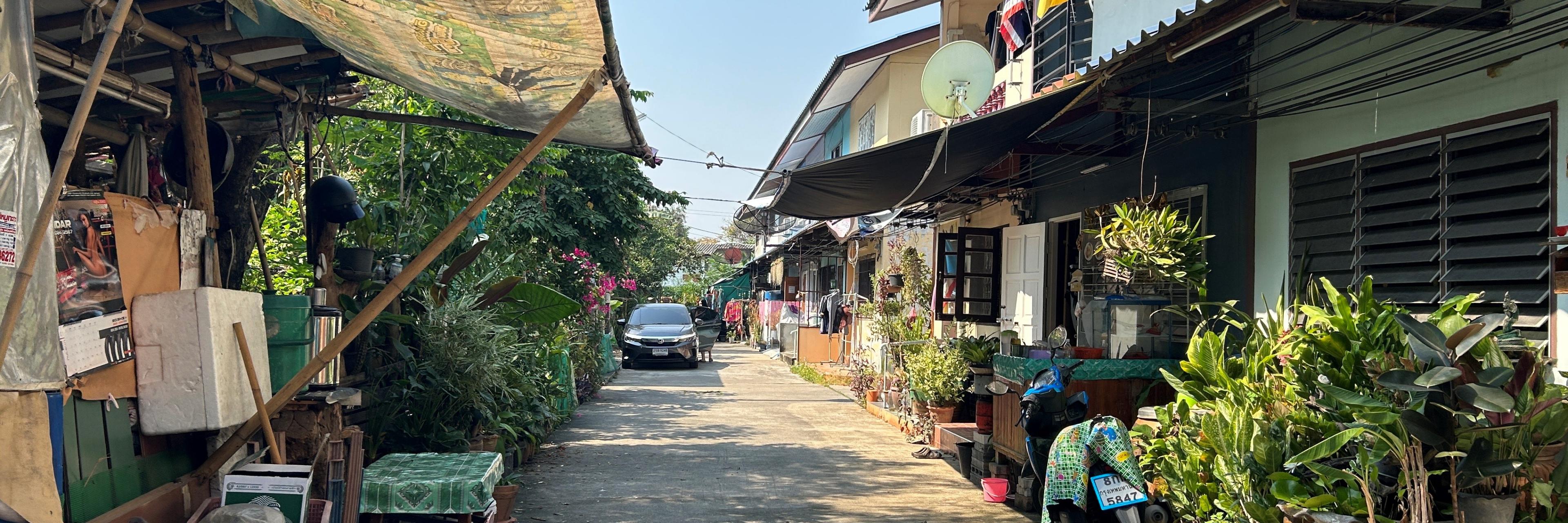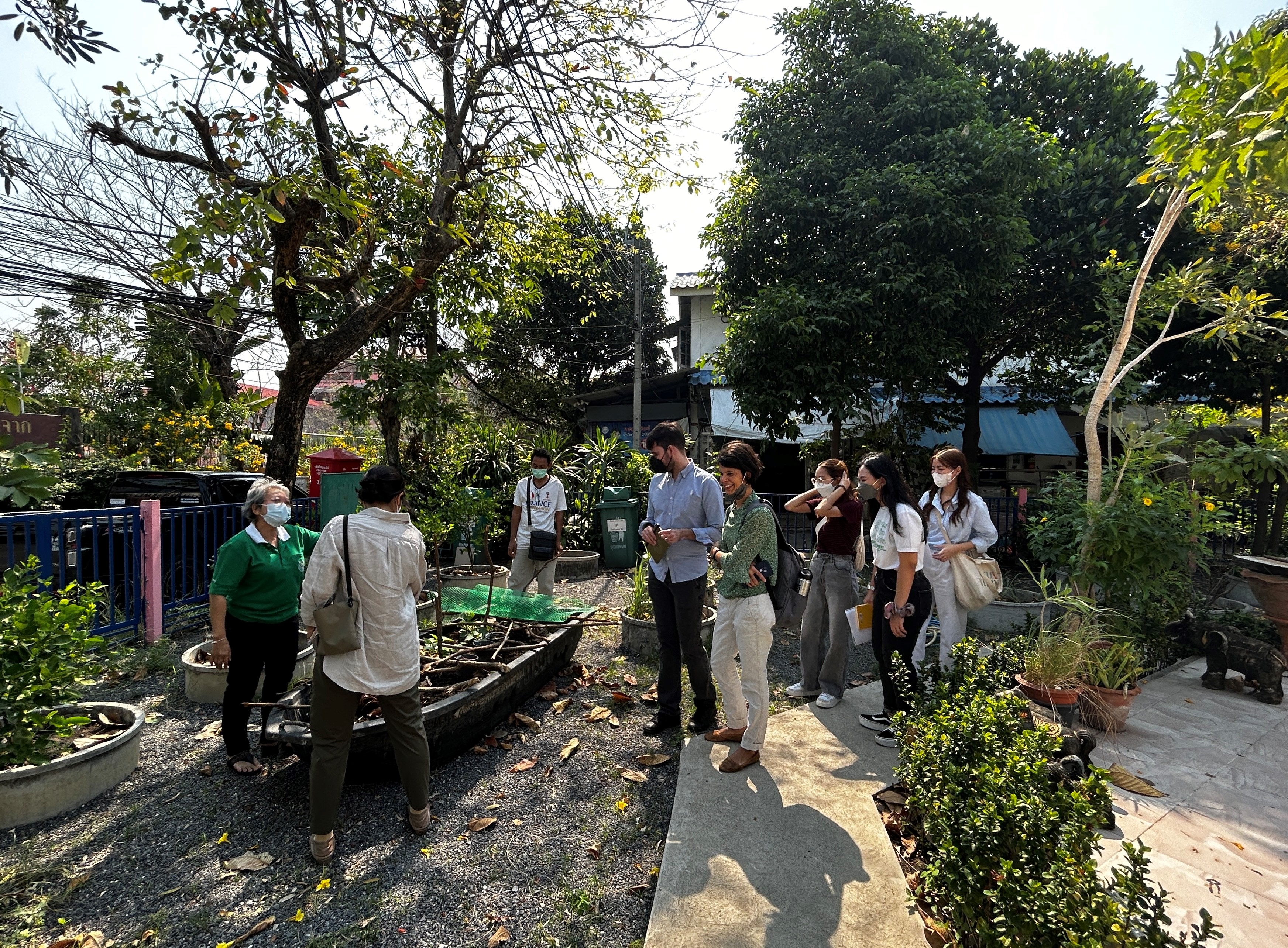
RCN Team-Bangkok: On Urban Nature and Waterways in Bangkok Housing Projects
Team RCN-Bangkok has investigated the barriers, benefits, and responsibilities of different stakeholders when implementing Nature-based Solutions (NbS) in housing projects in Bangkok. The comparison of the results from an online survey and semi-structured interviews with local residents shows that the perceptions of the surveyed stakeholders often differ from the residents' experiences with nature. While the surveyed stakeholders have a reasonable understanding of the barriers that prevent NbS from being implemented in Bangkok, the findings point to important gaps regarding costs, expectations and shared responsibilities that should be addressed to ensure that NbS can be effectively mainstreamed within housing projects.
By Boonanan Natakun.
Case study: the Baan Mankong (BMK) program in Thailand
Team RCN-Bangkok has published an academic article investigating the barriers, benefits, and responsibilities of different stakeholders when implementing Nature-based Solutions (NbS) in housing projects in Bangkok. All the case-study communities in the article are canal-side settlements and one of the case-study sites is Pracha Ruamjai 2 Community situated along Prem Prachakorm Canal which is our case-study river. The settlement has joined upgrading processes and citizen participation under the BMK project, a nationwide public housing program.
While trees are recognised as important by most of the interviewed residents, our findings indicate that tree planting in the housing projects is not a consensus among community members. Trees have been considered undesirable by some residents because their growth in settlements where land is scarce often leads to damage to property and interfere with power lines. In turn, trees have been characterised as a common reason behind conflicts between neighbours since their roots and branches do not respect plot boundaries agreed by the residents.
Gardens and trees were also perceived by residents as important spiritual and cultural elements with various other functions. Some plants and other natural elements such as tree stumps and termite mounds are considered spaces of spiritual importance for residents, who often built shrines and memorials in these spaces to honour deities and ask for blessings. The practice of sharing vegetables, tubers and fruits produced locally with the community was regarded as a key element to strengthen the bonds between residents. Trees were also described as desirable for providing shade, food and for preventing the erosion of the banks of canals in some of the settlements.
The lack of space in the housing projects and the trade-offs that planting trees and gardens entails were topics often mentioned during the interviews. As a precondition to participate in the BMK program, the communities are organised in the form of resident cooperatives. The interviews pointed at this model of organisation to support the argument that the land is managed collectively by the community. In this sense, the implementation of gardens in public spaces within the settlement can be decided by the community pending on the consensus among residents. Residents shared during the interviews that the need to negotiate with neighbours can become a barrier to planting more trees in the settlements.

Greening alleyways in canal-side housing projects by local residents. Boonanan Natakun 2024.
Barriers and responsibilities
Although the Prem Prachakorn canal, one of the case study, has been part of the everyday life of the residents of Pracha Ruamjai 2 Community, it seems to have nothing to do with the canal and little to do with the urban nature (standing trees, potted plants, community garden, open spaces with greenery) perceived by the residents. Therefore, NbS still needs to be considered at different levels as a solution for climate change mitigation and adaptation. We build upon the findings to examine why NbS are not fully incorporated into housing programs in Thailand and more broadly.
Finally, the comparison of the results from an online survey and a series of semi-structured interviews with the residents of the housing projects along waterways in Bangkok shows that the perceptions of the surveyed stakeholders often differ from the residents' experiences with nature. While the surveyed stakeholders have a reasonable understanding of the barriers that prevent NbS from being implemented in Bangkok, the findings point to important gaps regarding costs, expectations and shared responsibilities that should be addressed to ensure that NbS can be effectively mainstreamed within housing projects.
Find the full article here for in-depth insights: https://www.sciencedirect.com/science/article/pii/S0264275124004785
Greening alleyways in canal-side housing projects by local residents. Boonanan Natakun 2024.